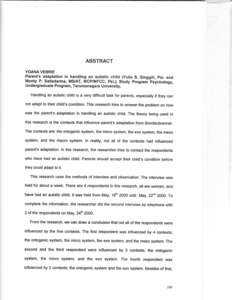VEBRIE, YOANA (2000) Adaptasi Orangtua Dalam Menghadapi Anak Autistik. Skripsi thesis, Universitas Tarumanagara.
![[img]](http://repository.untar.ac.id/9735/1.hassmallThumbnailVersion/IMG_0110.jpg)
|
Image
IMG_0110.jpg Download (848kB) | Preview |
|
![[img]](http://repository.untar.ac.id/9735/2.hassmallThumbnailVersion/IMG_0111.jpg)
|
Image
IMG_0111.jpg Download (399kB) | Preview |
Abstract
Handling an autistic child is a very difficult task for parents, especially if they can not adapt to their child's condition. This research tries to answer the problem on how was the parent's adaptation in handling an autistic child. The theory being used in this research is the contexts that influence parent's adaptation from Bronfenbrenner. The contexts are: the ontogenic system, the micro system, the exo system, the meso system, and the macro system. In reality, not all of the contexts had influenced parent's adaptation. In this research, the researcher tries to contact the respondents who have had an autistic child. Parents should accept their child's condition before they could adapt to it. This research uses the methods of interview and observation. The interview was held for about a week. There are 4 respondents in this research, all are women, and have had an autistic child. It was held from May, 18th 2000 until May, 22nd 2000. To complete the information, the researcher did the second interview by telephone with 2 of the respondents on May, 24th 2000. From the research, we can draw a conclusion that not all of the respondents were influenced by the five contexts. The first respondent was influenced by 4 contexts; the ontogenic system, the micro system, the exo system, and the meso system. The second and the third respondent were influenced by 3 contexts; the ontogenic system, the micro system, and the exo system. The fourth respondent was influenced by 2 contexts; the ontogenic system and the exo system. Besides of that, it also can be concluded that the results from the contexts among the parents differ from one to another, although the contexts that influenced were the same. This is due to their psychological abilities in handling stress and the supports they have had from others. Thus, eventhough their child was diagnosed as having autism, it does not mean that they could not give a brighter future for their child. It is important to realize that every effort they have done to improve their children's condition will give a big influence to their future.
| Item Type: | Thesis (Skripsi) |
|---|---|
| Additional Information: | Yulia S. Singgih, Psi dan Drs. Monty P. Satiadarma , MS/AT, MCP/MFCC |
| Subjects: | Skripsi/Tugas Akhir Skripsi/Tugas Akhir > Fakultas Psikologi |
| Divisions: | Fakultas Psikologi > Psikologi |
| Depositing User: | Admin Fakultas Psikologi |
| Date Deposited: | 31 Jan 2019 06:57 |
| Last Modified: | 08 Jul 2022 05:22 |
| URI: | http://repository.untar.ac.id/id/eprint/9735 |
Actions (login required)
 |
View Item |



